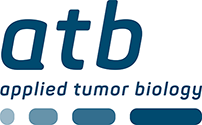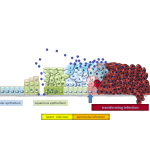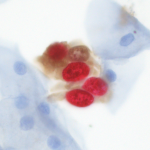HPV projects
Human papillomaviruses (HPV) can infect epithelial cells of the mucosa and skin in the human body. Most of these infections remain unnoticed as they do not cause detectable lesions of the skin or mucosal surfaces. In some cases, however, HPV can induce the growth of benign or (pre-)cancerous lesions.
Benign lesions comprise warts on hands and feet or in the anogenital tract and rarely laryngeal papillomatosis within the respiratory tract. In some distinct epithelial sites of the anogenital tract as well as in the oropharynx distinct oncogenic HPV-types can trigger the malignant transformation of their host cell and lead to the development of pre-cancerous lesions or finally cancers. It is estimated that about 5% of all cancers worldwide are caused by these high-risk (HR) HPV-types, particularly cancers of the uterine cervix, the anus, vulva and vagina and the oropharynx.
The carcinogenic activity of HR-HPV is linked to the overexpression of two viral genes referred to as E6 and E7. The major carcinogenic function of these genes relies in their ability to cause chromosomal instability and de-regulation of numerous biological processes by multiple interactions with host cell proteins.
The ATB team studies the molecular mechanisms how HPV can turn normal into (pre-)cancerous cells and applies the gained knowledge to develop novel diagnostic markers as well as targeted therapeutic approaches.
Our main research directions
Selected publications
Heller M, Prigge ES, Kaczorowski A, von Knebel Doeberitz M, Hohenfellner M,
Duensing S. APOBEC3A Expression in Penile Squamous Cell Carcinoma. Pathobiology.
2018;85(3):169-178. doi: 10.1159/000479007. Epub 2017 Nov 23. PubMed PMID:
29166639.
Prigge ES, Arbyn M, von Knebel Doeberitz M, Reuschenbach M. Diagnostic
accuracy of p16(INK4a) immunohistochemistry in oropharyngeal squamous cell
carcinomas: A systematic review and meta-analysis. Int J Cancer. 2017 Mar
1;140(5):1186-1198. doi: 10.1002/ijc.30516. Epub 2016 Dec 2. Review. PubMed PMID:
27859245.
Prigge ES, von Knebel Doeberitz M, Reuschenbach M. Clinical relevance and
implications of HPV-induced neoplasia in different anatomical locations. Mutat
Res Rev Mutat Res. 2017 Apr – Jun;772:51-66. doi: 10.1016/j.mrrev.2016.06.005.
Epub 2016 Jun 22. Review. PubMed PMID: 28528690.
Stich M, Ganss L, Puschhof J, Prigge ES, Reuschenbach M, Gutierrez A,
Vinokurova S, von Knebel Doeberitz M. 5-aza-2′-deoxycytidine (DAC) treatment
downregulates the HPV E6 and E7 oncogene expression and blocks neoplastic growth
of HPV-associated cancer cells. Oncotarget. 2016 Jul 16;8(32):52104-52117. doi:
10.18632/oncotarget.10631. eCollection 2017 Aug 8. PubMed PMID: 28881717; PubMed
Central PMCID: PMC5581016.
von Knebel Doeberitz M. The causal role of human papillomavirus infections in
non-anogenital cancers. It’s time to ask for the functional evidence. Int J
Cancer. 2016 Jul 1;139(1):9-11. doi: 10.1002/ijc.30059. Epub 2016 Mar 21. PubMed
PMID: 26999772; PubMed Central PMCID: PMC5071689.
Reuschenbach M, Pauligk C, Karbach J, Rafiyan MR, Kloor M, Prigge ES, Sauer M,
Al-Batran SE, Kaufmann AM, Schneider A, Jäger E, von Knebel Doeberitz M. A phase
1/2a study to test the safety and immunogenicity of a p16(INK4a) peptide vaccine
in patients with advanced human papillomavirus-associated cancers. Cancer. 2016
May 1;122(9):1425-33. doi: 10.1002/cncr.29925. Epub 2016 Mar 7. PubMed PMID:
26949913.
von Knebel Doeberitz M. HPV 16 and its variants: minor genome variations make
a big difference. J Natl Cancer Inst. 2016 Apr 29;108(9). pii: djw123. doi:
10.1093/jnci/djw123. Print 2016 Sep. PubMed PMID: 27130932.
Reuschenbach M, Huebbers CU, Prigge ES, Bermejo JL, Kalteis MS, Preuss SF,
Seuthe IM, Kolligs J, Speel EJ, Olthof N, Kremer B, Wagner S, Klussmann JP,
Vinokurova S, von Knebel Doeberitz M. Methylation status of HPV16 E2-binding
sites classifies subtypes of HPV-associated oropharyngeal cancers. Cancer. 2015
Jun 15;121(12):1966-76. doi: 10.1002/cncr.29315. Epub 2015 Mar 2. PubMed PMID:
25731880.
Prigge ES, Toth C, Dyckhoff G, Wagner S, Müller F, Wittekindt C, Freier K,
Plinkert P, Hoffmann J, Vinokurova S, Klussmann JP, von Knebel Doeberitz M,
Reuschenbach M. p16(INK4a) /Ki-67 co-expression specifically identifies
transformed cells in the head and neck region. Int J Cancer. 2015 Apr
1;136(7):1589-99. doi: 10.1002/ijc.29130. Epub 2014 Aug 19. PubMed PMID:
25104331.
Koerber SA, Schoneweg C, Slynko A, Krug D, Haefner MF, Herfarth K, Debus J,
Sterzing F, von Knebel Doeberitz M, Prigge ES, Reuschenbach M. Influence of human
papillomavirus and p16(INK4a) on treatment outcome of patients with anal cancer.
Radiother Oncol. 2014 Dec;113(3):331-6. doi: 10.1016/j.radonc.2014.11.013. Epub
2014 Nov 22. PubMed PMID: 25465729.
Prigge ES, Urban K, Stiegler S, Müller M, Kloor M, Mai S, Ottstadt M, Lohr F,
Wenz F, Wagner S, Wittekindt C, Klussmann JP, Hampl M, von Knebel Doeberitz M,
Reuschenbach M. No evidence of oncogenic KRAS mutations in squamous cell
carcinomas of the anogenital tract and head and neck region independent of human
papillomavirus and p16(INK4a) status. Hum Pathol. 2014 Nov;45(11):2347-54. doi:
10.1016/j.humpath.2014.08.001. Epub 2014 Aug 23. PubMed PMID: 25257576.
Ikenberg H, Bergeron C, Schmidt D, Griesser H, Alameda F, Angeloni C, Bogers
J, Dachez R, Denton K, Hariri J, Keller T, von Knebel Doeberitz M, Neumann HH,
Puig-Tintore LM, Sideri M, Rehm S, Ridder R; PALMS Study Group. Screening for
cervical cancer precursors with p16/Ki-67 dual-stained cytology: results of the
PALMS study. J Natl Cancer Inst. 2013 Oct 16;105(20):1550-7. doi:
10.1093/jnci/djt235. Epub 2013 Oct 4. PubMed PMID: 24096620; PubMed Central
PMCID: PMC3814411.
Funding and Grants
Das Projekt “ViMREX” wurde im Rahmen des EXIST-Programms durch das Bundesministerium für Wirtschaft und Energie und den Europäischen Sozialfonds vom 01.04.2015 bis 31.07.2018 gefördert.













